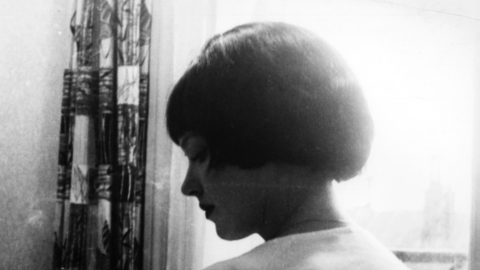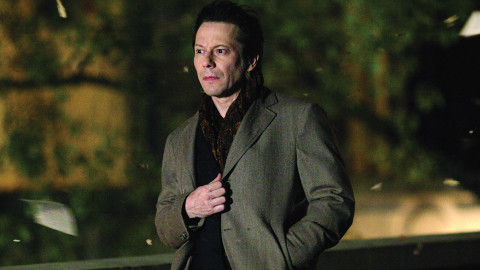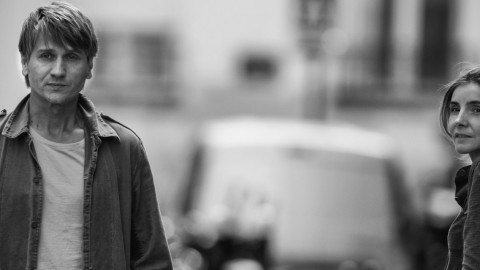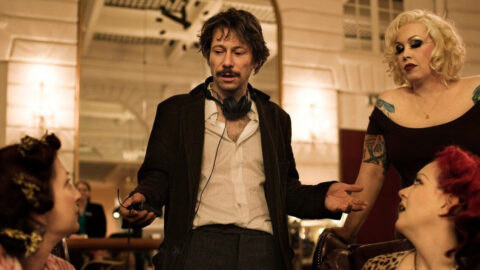NYFF Interview: Louis Garrel
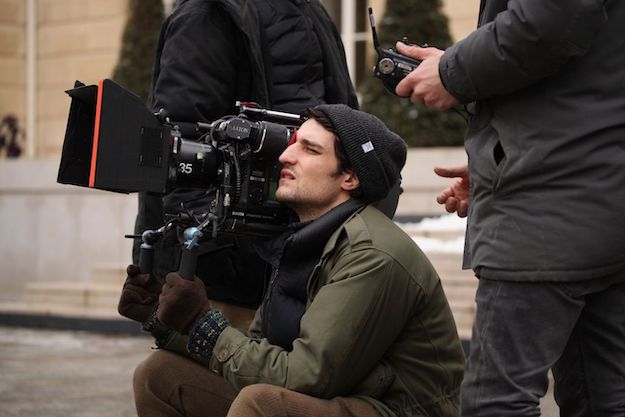
“We live in a story, our own, as well as in the stories of a few people close to us. And we also live in other stories, which we share with our neighbors, with our people, sometimes with the entire world.”
—Jean-Claude Carrière, Raconter une histoire. Quelques indications
Louis Garrel’s directorial debut, Two Friends (2015), starred Vincent Macaigne and Garrel as a modern slapstick duo drifting through Paris in search of romantic fulfillment. A product of the 35-year-old actor’s maturation, his sophomore feature, A Faithful Man, relinquishes youthful fervor to navigate the bewildering territory of parenthood through the story of Abel (Garrel) and Marianne (Laetitia Casta), a Parisian couple that separates in the film’s opening and subsequently reconciles. Prompting their reconciliation is the sudden death of their offscreen best friend, Paul, a decade after impregnating Marianne with a son. Paul’s ingénue sister, Eve (Lily-Rose Depp), complicates the equation by confessing her love to Abel and luring her rival into a Marivaudian seduction conquest. But Garrel and co-writer Jean-Claude Carrière shift our attention onto the boy, Joseph (Joseph Engel), as he conspires to generate the turmoil and simultaneously alleviate it.
Punctuated by the adult protagonists’ introspective voiceovers, A Faithful Man draws vitality from the primal pleasures of storytelling. Under Carrière’s influence, a recognizable tale of romantic duplicity acquires peculiar implications, while remaining indebted to an intimate tradition of French cinema that champions the representation of feelings. A year after interviewing his father, Philippe, in Paris, I spoke with Louis Garrel on the phone from the French capital in the wake of A Faithful Man’s U.S. premiere at the New York Film Festival last Sunday. It screens there again on October 13.
Two Friends was concerned with friendship, whereas A Faithful Man pushes friendship off screen in favor of exploring a couple’s dynamics. It’s a leap from collective to personal identity and from youth to adulthood. What was the impetus behind this shift in focus?
In Two Friends, the characters were overgrown adolescents, and in A Faithful Man, we might say that they are premature adults. Adulthood means responsibility, and for me, this immediately has to do with one’s relationship with their children. In order to have a relationship with your children, you somehow always have to pretend to be an adult. It begins as an imitation of something you’ve seen and slowly turns into an instinct of responsibility. As far as this film is concerned, I don’t exactly know how I thought it out, because one doesn’t always analyze their own creative process. We wrote the script with Jean-Claude Carrière without a producer attached to it, a bit in the manner of the surrealist Exquisite Corpse game that you play when you’re a kid: one of us would write a scene and then the other one would write another scene based on that.
So the story emerged that way?
Well, I gave Jean-Claude the premise, the story of a widow and a man who has been dumped, which comes from a classic play by Marivaux, La Seconde Surprise de l’amour [The Second Surprise of Love].
Deep down, A Faithful Man could have been called The Game of Love and Chance [the title of another Marivaux play]…
Yes, you could absolutely say that. But then I got scared, because I thought that a widow and a man who has been dumped sounds like the setup of David O. Russell’s Silver Linings Playbook. At the same time, it was crazy that Marivaux had already thought up this story 400 years ago. My first film was very sentimental, in the sense that the characters spent their entire time making love declarations to each other in a passionate way, and I was thinking a lot of Patrice Chéreau when I made it. Something that’s always fascinated me about Chéreau is that his characters are very feverish and always tell each other their feelings with a lot of passion, so I made Two Friends in that spirit and had my characters say what they thought all the time.
With A Faithful Man, on the other hand, I had a different point of view: what the characters think in this film is never what they actually say. And this is very connected to something real, because in general, people tend to think that what you express is always the product of a preconceived thought. But sometimes, it’s through expressing something that we think, so the thought and its wording are simultaneous. We are not prepared for each and every situation in life and sometimes we may surprise ourselves by acting in a way that we hadn’t premeditated at all, and this film is about that. It’s about the impulse of the moment and how feelings are constructed in the immediacy of the moment. And this is a lesson that I learnt from Marivaux, whom you know because you live in France, but I believe Americans don’t really know him. Marivaux worked a lot on the fact that the more you hide a feeling, the more it becomes visible, and on the other hand, if you want to show a feeling, the person in front of you cannot necessarily read it. We always prefer reading something that wants to be hidden because curiosity is pleasurable. Afterward, there was also a constant battle between Jean-Claude Carrière and myself regarding psychology. I’m quite sentimental so I’m very attached to psychological logic, whereas Jean-Claude, who has more experience than me, does not have that fondness for psychology at all. So sometimes he would propose scenes and I would say: “But isn’t that a bit surprising? Are you sure people will accept that from the characters?”
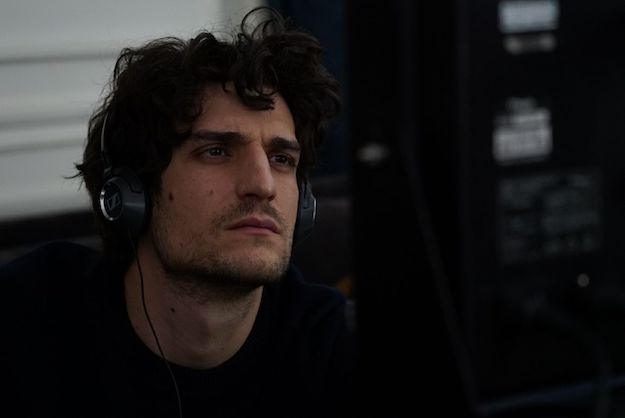
There was indeed one moment that struck me particularly. It’s when you pair a shot of Abel watching a split-screen news broadcast of war atrocities with the voiceover line: “Imagining Marianne as a poisoner unsettled me, but excited me a little too.” It’s quite outrageous to juxtapose an erotically twisted thought with the traumatic sight of our crumbling world.
People have much more surprising and outrageous thoughts than they let appear. Most of the time, we are filled with aggressive and morbid impulses, but we domesticate ourselves in order to come across as acceptable. That’s why we had fun writing three voiceovers with Jean-Claude, because we could play with this discrepancy between the characters’ thoughts and what we see of them. I really liked doing this within a story that could externally be seen as a kind of déjà vu in cinema, that of a man torn between two women. And within this rather classic argument, I liked having strange digressions from time to time, something bizarre inside an intrinsically familiar circle.
There’s a palpable Desplechinian influence in your attempt to revisit a typical setup of French cinema from a genre perspective. Did you have Desplechin’s universe in mind while writing?
Arnaud Desplechin’s cinema is beyond important to me and one with which I share an enormous intimacy. But what I especially love about the latest part of his oeuvre is how he is constantly quoting other genres like the detective film or the thriller to play with the audience in the process of recounting his own sentimental or existential novel. So he has understood something crucial about cinema: the fact that it can be treated as a popular art form to entertain viewers while subterraneanly transmitting existential ideas to them. And this is something that we really loved doing with Jean-Claude as well, to have the film switch between different genres, from the spy movie and the Hitchcockian thriller, with a very opaque female character, to the romantic comedy and the comedy of remarriage, through the story of someone who is reunited with a person he had separated from in the past, to gag comedy, because there are also gags in the film. So I liked having this sort of marivaudage of genres.
You know, Claude Chabrol said something that interested me a lot in a book he wrote: the fact that there are two categories of filmmakers, the poets and the storytellers, those who say, “Once upon a time.” You might say, “Once upon a time” to a child with the hope of getting him to sleep, and in our film, we try to say, “Once upon a time” to the audience to keep them awake. Jean-Claude Carrière is a screenwriter who constantly plays with the intelligence and thwarts the expectations of the spectator, so he taught me a few rules. And what was extremely amusing to do in this film was to create a fiction with a well-known subject matter while continually bending the expectations of the audience and taking them to places they never expected to go. In the opening scene, for example, the credits are over the Paris skyline and the Eiffel Tower, so you expect a very Parisian and cosy sort of film. But what follows is so dry that I find it a bit destabilizing.
It’s also destabilizing because of Abel’s way of resigning himself to his fate. The narrative has a fable-like quality and seems to be designed to propel Abel from a state of submissiveness to one of agency in which he is able to take on the role of father, as in that scene of father-son recognition toward the end of the film when Abel and Joseph exchange a long glace outside the school. I imagine you and Carrière had discussions about Abel’s trajectory.
Jean-Claude Carrière has worked with Pierre Étaix, who was a clown before becoming a filmmaker, and I also worked with clowns when I was at school. So there was this idea of the clown, in the sense of having a character who is slightly different and somewhat out of sync with the world. The mechanism of the character of Abel was that he would get several bangs on the head for the cruel pleasure of the spectator, but would never complain. If you take a great clown like Buster Keaton, he is always punched in the face by the brutality of the world, and yet he never complains. On the other hand, that’s one of Buster Keaton’s biggest strengths, because his passivity, which is a comedic one, also reveals itself to be a mark of endurance.
It’s a survival strategy.
Yes, a way of sailing through and coming back to life over and over again. That is to say that Abel, who has spent the whole film being tossed around like a toy, is the one standing at the end. Deep down, the film is the metaphor of a world in which the adults twist and turn, while the child waits for the world to be stabilized. That’s why there is a cooling down in the finale after a game around everyone’s desires. To go back to the opening, some people might be shocked by it upon reading the script, thinking, “How can that character barely react?” In a conventional domestic quarrel scene, Abel would rebel against Marianne by saying something like, “How could you do such a thing?” But the truth is, if you want to be a little idiosyncratic, you have to handle that break-up scene differently, and I find that by being idiosyncratic, you somehow get closer to the truth. In fact, I was listening to people’s reactions in the theater and felt like they were laughing at that scene, and if they laugh, it means there is something truthful about it, because laughter unlocks a person’s truth.
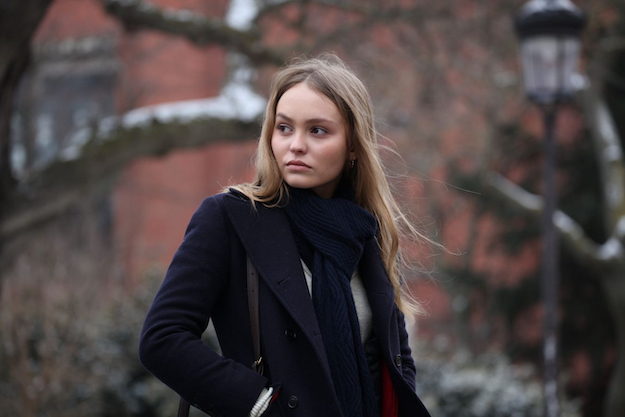
Why did you make Abel a journalist?
I don’t really know why, but I have journalist friends, and I think it’s because a journalist is someone who is confronted with the worst things all day and starts to become emotionally impermeable after a while. So it felt like the right profession for Abel.
But you don’t really involve the audience in Abel’s professional life.
It’s true that it’s not developed. But to be perfectly honest, I had the desire to film a newspaper office because I love films about investigative journalists, like All the President’s Men or Network. I was lucky to be able to shoot those scenes in a real editorial office, and since we were a small team, we were allowed to capture journalists in their authentic environment.
The state of the world that Abel is confronted with as a journalist finds an echo in Joseph’s obsession with murder. To me, he’s really a kid whose unconscious is shaped by television imagery, so he’s internalized the threat of the adult world and that’s why he has a slightly cruel edge to him and somewhat of an Oedipus complex. But that’s actually just a shield for his vulnerability. How did you present the character to the actor, Joseph Engel?
When we meet 9-year-olds, we forget how much they have already understood the world. Of course, children cannot be independent, but they completely grasp human relations and even the mechanics of sexuality in ways that we are not aware of. So with Joseph, I made him read the script and then I presented him the two actresses, asking, “Which one do you prefer?” [Laughter] Since we both come from families with separated parents, we spoke at length about a child’s relationship with his stepfather. When you’re a kid and you have a stepfather, the feelings you develop for him are very deep, in the sense that there’s a violent perversity involved in your interactions, and asking him for affection might be your way of better cornering him. So we worked a lot on this idea that Joseph would turn out to be much more cunning than the other characters in maneuvering situations. At the beginning, I thought this wasn’t the kind of script he would grasp from the get-go, that I would need to explain him certain things, but he understood it perfectly. Once again, we tend to forget how accurate an understanding children actually have of sexuality. And since Joseph has a genuine acting gift, he understood right away that it would be rewarding for him to play a manipulative kind of character and that the audience would love seeing a kid who is not represented from the perspective of an adult, but in a way that we don’t often get to see kids on screen. In that regard, maybe we had an unconscious memory of Jonathan Glazer’s Birth, which is a film that I adore and was also co-written by Jean-Claude.
To pick up on that idea, I was wondering whether you and Carrière ever alluded to your father’s films that he co-wrote as you were developing the script, especially the latest one, Lover for a Day [2017], which deals with the Electra complex.
Not really. We had a different way of working, because me being an actor and Jean-Claude being a screenwriter, I could perform scenes to him while we were writing. To return to what I said earlier, Philippe [Garrel], as a director, is more of a poet, whereas I wanted to make a kind of humorous fable that contains profound truths, but whose form is closer to a… How to call it? Maybe an existential comedy or a comedy of manners. So Jean-Claude would often tell me about Pierre Étaix, and I felt that his biggest pleasure as a screenwriter was to make people laugh. I think that what he is looking for now after having written so many screenplays is to surprise people. For instance, he would call me at midnight to say, “Oh, I have an idea,” and suggested things that would never cross anybody’s mind.
He is really a genius of planting elements and then paying them off, like the subplot with doctor Pivoine [i.e., Peony] and the way his name is revealed to Abel as he walks by the flower shop.
What’s great about Abel and Joseph’s first scene is that their dialogue felt a bit schematic on the page, but then it took on a perfect rhythm on screen. At the beginning, I wasn’t sure whether their exchange, “How is the doctor called? He has a flower name,” would work, but when I see it on screen, I just find the enumeration of flowers so pleasurable. One thing that’s terrific about Jean-Claude is that he is never afraid of mixing triviality, even vulgarity, with a high degree of sophistication. So he can be very popular and extremely sophisticated at the same time.
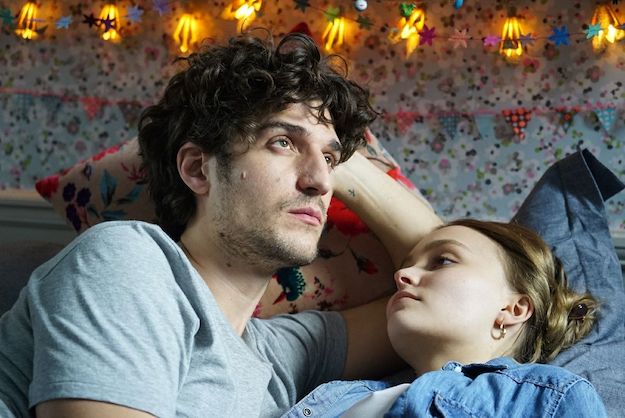
Since we need to wrap up, I’d like to ask about something specific that’s caught my attention. Your directing credit on both of your features is “Mise en scène by Louis Garrel.” Although Truffaut famously used that credit, most filmmakers today opt for the more conventional “Directed by” or “A film by.” Is using the word “mise en scène” a way of inserting yourself into a cinematic tradition?
No, it’s because I have a theater background, and “mise en scène” is a very noble word that comes from theater. You would never say, “a play directed by,” but rather, “a play mise en scène by,” because in theater, there are the actors and there is the mise en scène.
What do you get from directing that you can’t get from acting?
When you write a script, you tell yourself that you want to surprise the audience by finding things they didn’t expect. And what I really love about working with actors is that they bring their own interpretation of the script and find things in it I didn’t expect, but sometimes I also love giving them suggestions they hadn’t thought of. For instance, there is a scene I’m very happy with, because I love the way Laetitia and Lily performed it: it’s when Eve declares war to Marianne. I love it, because they declare war to each other with a crazy elegance, a gentle and noble kind of aggressiveness. When Laetitia and Lily heard this, they took an immense pleasure in performing the scene, and I can have that relationship with the actors since it’s my film. But when you’re an actor, you can’t really allow yourself those kinds of interventions.
Translated by Yonca Talu.
Yonca Talu is a filmmaker living in Paris. She grew up in Istanbul and graduated from NYU Tisch.



